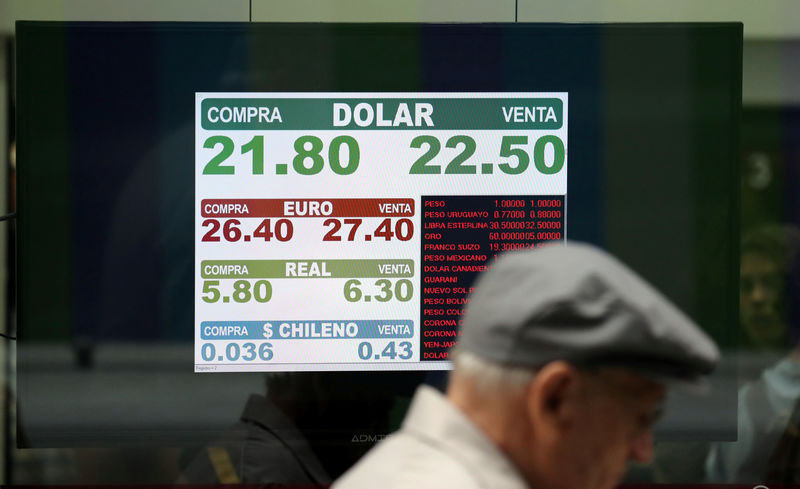 © Reuters. A man walks by an electronic board showing currency exchange rates in Buenos Aires
© Reuters. A man walks by an electronic board showing currency exchange rates in Buenos AiresBy Hugh Bronstein and Nicolás Misculin
BUENOS AIRES (Reuters) – Argentina’s government and central bank jolted the country’s battered currency back to life on Friday with a set of announcements intended to restore confidence in the president’s ability to deliver sustainable growth while cutting inflation.
The central bank sharply raised its monetary policy rate to 40 percent, sparking a 4.78 percent jump in the local peso while the government cut its fiscal deficit target to 2.7 percent of gross domestic product (GDP).
The moves followed a week of dramatic weakening in the peso
The bank said in a statement it would keep using all tools at its disposal in its effort to reach the country’s 15 percent inflation target for this year.
Treasury Minister Nicolas Dujovne told reporters the government stood by the 15 percent target and supported the central bank’s efforts.
The bank has increased the key rate three times – on April 27, then on Thursday and again on Friday, yanking it up from 27.25 percent.
Private economists and investors have complained about the slow pace of progress in narrowing the primary fiscal deficit, which does not include interest payments on debt.
The target had been 3.2 percent of GDP before Dujovne tightened it to 2.7 percent.
Speaking about the 0.5 percentage point cut in the deficit target, Dujovne said ” … part of the cut comes from greater than expected resources at our disposal, because tax collection is evolving better.”
The rest will come from an increased effort at generating savings, the minister added. The government expects 3 percent economic expansion this year, including the risk presented by a drought that has shriveled the harvest of Argentina’s main cash crop, soy, and could shave up to 1 percentage point off growth.
Dujovne acknowledged that jacked-up interest rates will be somewhat of a drag on the economy, but said he hoped monetary policy can be relaxed before long.
The country has adopted policies aimed at spurring economic activity ahead of President Mauricio Macri’s expected 2019 re-election bid. The perception of political pressure on the bank to grease economic activity by keeping the money tap open had cast doubt on its willingness to raise interest rates.
The rapid-fire rate hikes appeared to dispel those doubts.
‘CALM THE MARKET’
“The rate hikes and new deficit target are positive developments,” said Gabriel Zelpo, chief economist at local consultancy Elypsis.
“They needed to calm the market before there was a run on the peso,” Zelpo added. “This is still an economy that is not stable and needs a lot of reform. They’re doing everything they can.”
A spike in the U.S. dollar over the last three weeks and expectations of accelerating U.S. inflation have soured investor appetite for emerging markets. The specifics of Argentina, stymied by one of the world’s highest inflation rates, have made it stand out as particularly vulnerable to investment losses.
Consumer prices in Argentina
in March, putting the 12-month inflation rate at 25.4 percent.
Some economists urged the government to abandon its 15-percent inflation target for this year, saying it is unrealistic.
The markets have given Macri the benefit of the doubt for more than two years after taking power in late 2015.
He has ditched the previous government’s foreign exchange and trade controls and helped the farm sector by cutting grains export taxes. Macri has also brought the country back into the international capital markets by settling protracted lawsuits brought by the holders of defaulted sovereign bonds.
Macri promised to “normalize” the long-troubled Argentine economy. Confidence lasted until interest rates started climbing internationally and the government, looking for money to help narrow the deficit, slapped a new tax on international investors last week. That’s when the peso started its recent sell-off.
Source: Investing.com


























